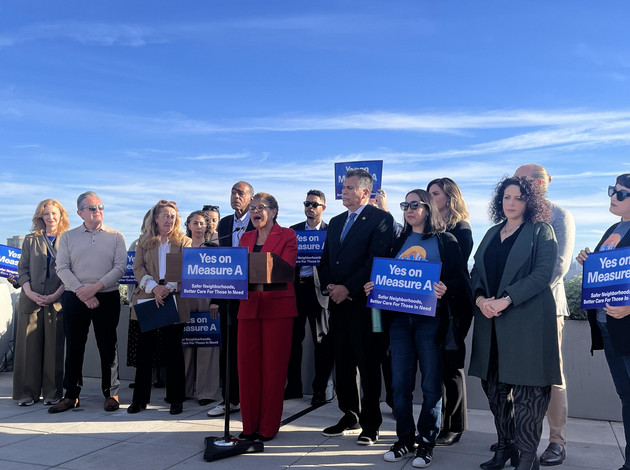Measure A, which would extend and increase a county-level tax to tackle homelessness, faces political headwinds in a year when voters are wary of approving new spending.
Residents of California’s biggest metropolis say homelessness is the issue that worries them most, but that doesn’t necessarily mean they’re ready to spend more to address the problem.
In the balance is Los Angeles County’s Measure A, which would extend and increase a county-level tax to continue funding the local government’s homeless services as well as affordable housing development, rent relief and resources to prevent evictions.
The initiative’s backers, including Los Angeles Mayor Karen Bass, are discovering more government spending to be a difficult sell at a time when penny-pinching voters are skeptical that money is being used effectively. Recent polls show the county’s voters split on the measure just seven years after they overwhelmingly supported Measure H, a 10-year, quarter-cent sales tax to address homelessness.
“We have very little concern or pushback on any of the affordable housing components of this,” said United Way of Greater Los Angeles Vice President Tommy Newman, whose group is involved in the Yes on A campaign and serves as its top funder. “Where you run into a lot of questions and some concern is around homelessness, specifically. Voters continue to see those two things very distinctly.”
The measure faces no organized opposition — instead, its biggest hurdle is a skeptical electorate’s ambivalence about spending on homelessness issues.
Measure A would increase the city’s existing 9.5 percent sales tax by an additional quarter-cent and bring in more than $1 billion per year. The previous Measure H tax is set to expire in 2027. Backers of Measure A say letting it expire without putting something new in place would be existential in a region where homelessness is particularly acute, with 75,000 unhoused people in the county as of the most recent annual count.
“We need everyone in Los Angeles County to understand that if Measure A does not pass, critical funding for homeless shelter services and housing will be lost,” Bass said at a press conference Monday morning. “We cannot afford to go backward.”
Hovering over all of this year’s new spending proposals, including two statewide bond measures of $10 billion each, is the experience of Prop 1 on this March’s primary ballot. The $6.4 billion bond to fund mental-health services, which Gov. Gavin Newsom promoted as an anti-homelessness measure, looked strong in the polls leading up to Election Day but prevailed only by a razor-thin margin.
A state audit report released this spring found that California did not consistently track the effectiveness of $24 billion worth of spending to combat homelessness, which further fueled skepticism about handing governments more money on the issue. A separate report from the LA City Housing Department estimated the cost of solving homelessness in the city would be $21.7 billion.
“Most voters believe the current spending on homelessness is fraught with abuse, waste and fraud,” said LA-based Democratic consultant Michael Trujillo. “We see these audits saying the state can’t account for billions of dollars and how we spent them, and this feels like we’re rewarding the same leaders.”
To address those concerns, Measure A’s backers have focused heavily on the accountability requirements built into the proposal. They argue this measure, crafted by experts rather than politicians, will require programs receiving funding from Measure A to set five-year goals and potentially lose that money if they don’t deliver.
“What a lot of people don’t understand is that it’s not as though we just don’t want to share numbers — the current system was not set up that way,” Bass told reporters Monday. “Measure A will really allow us to do that … by setting in the outcome and the transparency and the accountability measures with consequences if they’re not met.”
The campaign placed a full-page ad in the Los Angeles Times earlier this month to drive home that point: “Greater LA’s approach to homelessness needs to change,” it says, asserting Measure A would “apply lessons learned” to “get real results.”
“We know that taxpayers are frustrated. We’re all frustrated,” Miguel Santana, CEO of the California Community Foundation, an LA-focused nonprofit that is backing the measure, said at Monday’s press conference. “It’s from that frustration that Measure A was developed, because we took all the lessons learned from previous efforts … and applied [them] directly. What this does is creates accountability, it creates one system with one set of goals.”
It’s tough to tell whether that messaging will be enough in what appears to be a close race. Public polling has shown Measure A falling just short of the 50-percent mark. A late September survey from UC Berkeley’s Institute of Governmental Studies found support at 49 percent, compared with 33 percent who would vote “no” and 17 percent who remained undecided. (Still, IGS found an upward trend from August, when 47 percent of voters supported the measure and 36 percent opposed it.)
Newman said the Yes side’s polling shows similar numbers, but that after explaining the proposal’s benefits and the drawbacks of not passing it, they’ve seen support rising enough to get it above 50 percent.
“I think that there’s a lot of frustration out there, and that’s going to show up in the vote totals,” he said. “But when folks learn what’s at stake, the risk of a 28 percent increase [in homelessness] if the funding expires, how this is different [from previous measures] with increases in prevention and housing, it moves a lot of those undecideds to yes.”
Measure A comes as LA county officials see small signs of hope that the trend line may be heading in the right direction. The county’s unhoused population fell by 0.3 percent compared to the previous year, after the numbers grew for five consecutive years. The drop-off was even greater in Los Angeles city, which saw a 2.2 percent decrease in overall homelessness and a 10 percent reduction in the number of people living on the street.
Jennifer Hark Dietz, the CEO of PATH, which works to place unhoused people in transitional and long-term housing, said much of that progress would be undone if Measure A doesn’t pass.
“If we don’t invest in what we know ends homelessness, which is creating more affordable housing and helping people directly on the streets identify and locate that affordable housing, then I think we’re going to continue to see people languish,” she said. “Measure A allows us to put the resources into place so that we can think of homelessness as the crisis it is today.”




